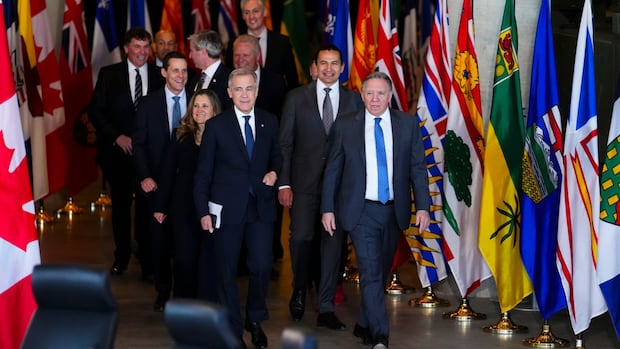Prime Minister Mark Carney’s main focus will be on project development as he sits down with provincial and territorial premiers this week.
First ministers are gathering in Saskatoon Monday for the first time since the April 28 federal election.
Carney told CBC’s Power & Politics in an exclusive interview last week that “major projects” will be his main agenda item for Monday’s meeting.
Prime Minister Mark Carney sat down for a wide-ranging one-on-one interview with CBC’s Power & Politics host David Cochrane on Tuesday. Carney addressed Canada’s current relationship with the U.S. along with the challenges ahead for his new government, including housing affordability and separatist sentiment in Alberta.
“We need to move on these nation-building projects. So projects that bring Canada together, projects that diversify our economy, projects that help us export to new markets and really move this economy forward,” Carney told host David Cochrane.
“The ask of provinces, the ask of the private sector is: Which projects do you have that reach those criteria? What we’re going to do is fast-track the approval, truly fast-track the approval, of those projects.”
Project approval was a significant part of last week’s throne speech read by King Charles. The speech promised to “unleash a new era of growth” by creating a federal project review office and reducing regulatory reviews “from five years to two.”
The Liberals are aiming to introduce legislation this month that would introduce “up-front regulatory approvals” to major projects in the national interest, according to a federal document CBC News obtained.
Premiers pitch their project ideas
A number of provinces and territories have already begun floating ideas for major economic projects that they’d like to see happen.
N.W.T. Premier R.J. Simpson said his region has “not had the same type of investment in infrastructure that the rest of Canada has seen” during an interview on Rosemary Barton Live that aired Sunday.
Simpson said his territory and Nunavut are pursuing a road through the Slave Geological Province, which would connect western Nunavut and an area in the Northwest Territories believed to be rich in minerals.
- Cross Country Checkup is asking: Does Canada need another energy pipeline? Leave your comment here and we may read it or call you back for our show today.
“That’s a project that’s been talked about for generations, for decades, [but] hasn’t advanced yet. So that is one I’m really excited about,” Simpson told host Rosemary Barton.
Western premiers met last month to discuss a range of issues that included energy, Arctic security and economic corridors.
Specifically, the premiers called for Carney’s “full support for the development of an economic corridor connecting ports on the northwest coast and Hudson’s Bay.”
Manitoba Premier Wab Kinew wrote to Carney shortly after the election, voicing his support for a similar economic corridor that includes Manitoba’s Port of Churchill. He said such a corridor could help western provinces get resources to international markets.
Manitoba Premier Wab Kinew says the Carney government has shown an ‘openness to collaborate’ with western premiers, and is calling for ‘national unity projects’ to be discussed at next week’s first ministers’ meeting in Saskatoon.
“If we sit around talking about politics, it’s going to be like the family dinner table. We’re always going to be arguing. But if we get down to work and we choose some economic projects to build the country — that’s how we bring people together,” Kinew said in a separate interview on Power & Politics last week.
“When we get together for our formal first ministers’ meeting with the prime minister, I think you’re going to see a unity of purpose.”
Like Kinew, Ontario Premier Doug Ford wrote to Carney laying out his ideas for major projects that he would like to see developed, including critical mineral deposits in Ontario’s Ring of Fire. Saskatchewan Premier Scott Moe also sent a list of priorities to the prime minister that included the expansion of pipeline projects.
Alberta Premier Danielle Smith sent a letter to Carney in mid-May and said the prime minister has “the opportunity to address serious issues plaguing Canada’s economic well-being — and the very real sense of alienation felt across the west.”
Smith said there are several preconditions necessary to make Carney’s nation-building ambitions a success: Include an oil pipeline on the initial list of nation-building projects, abandon the “unconstitutional” oil and gas emissions cap, overhaul the Impact Assessment Act and repeal Canada’s industrial carbon tax as well as clean electricity regulations.
The Alberta premier also said she’s appointed a provincial negotiating team and called on Carney and B.C. Premier David Eby to do the same.
“A collaborative approach between the relevant federal departments and the Governments of Alberta and British Columbia that enables a common understanding of project economics, barriers and opportunities will be critical to reaching a positive outcome,” Smith said.
Carney told Power & Politics that he’s seeking to have projects compete for federal approval, with the best ideas winning out.
“In effect, we’re going to have a competition with projects. Some projects are good ideas, but they’re not ready. Others are ready, but they’re bad ideas,” he said.
Carney had previously met with premiers in March and committed to removing internal trade barriers by July 1.


